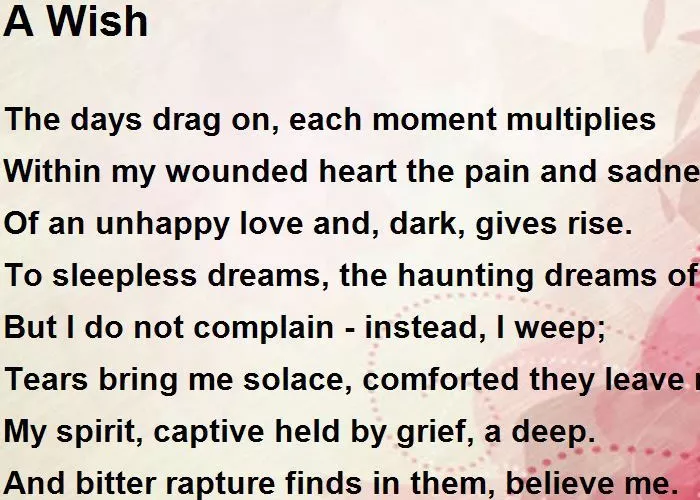Welcome to Poem of the Day – A Wish by Alexander Sergeyevich Pushkin.
Alexander Sergeyevich Pushkin, often regarded as the greatest Russian poet, crafted numerous works that have left an indelible mark on literature. One of his more poignant and insightful poems is “A Wish,” which encapsulates his mastery of language, his deep understanding of the human condition, and his ability to express universal emotions in an intimate and personal way. In this essay, we will delve into the themes, structure, and literary devices used in Pushkin’s “A Wish,” as well as the poem’s broader significance.
A Wish Poem Poem
The days drag on, each moment multiplies
Within my wounded heart the pain and sadness
Of an unhappy love and, dark, gives rise.
To sleepless dreams, the haunting dreams of madness
But I do not complain – instead, I weep;
Tears bring me solace, comforted they leave me.
My spirit, captive held by grief, a deep.
And bitter rapture finds in them, believe me.
Pass, life! Come, empty phantom, onward fly.
And in the silent void of darkness vanish.
Dear it to me my love’s unending anguish;
If as I die I love, pray let me die.
A Wish Poem Explanation
“A Wish” is a lyrical poem that captures the essence of human longing and the yearning for something unattainable. The title itself, “A Wish,” signals that the poem is centered on a personal desire, but one that is not entirely specific or material. Instead, Pushkin focuses on a more universal yearning: the longing for inner peace, love, and the idealized state of happiness.
The poem is framed as a plea, a reflection of the poet’s innermost desires. The speaker in the poem expresses a wish that transcends material wealth and worldly achievements. Rather than wishing for riches or fame, the speaker longs for a simple, yet profound, emotional fulfillment—specifically, a wish for someone’s affection and a connection with the natural beauty around them.
Structure and Style
The structure of “A Wish” is simple yet effective. Pushkin uses a regular rhythm, with rhymed couplets that flow smoothly, much like the ebb and flow of desire itself. This form is particularly well-suited to the poem’s theme, as it reflects the steady, rhythmic nature of yearning and the constant pull between what is desired and what is unattainable.
Pushkin’s language in the poem is accessible yet poetic, with clear imagery and strong emotional resonance. The simplicity of the language, along with the balanced rhythm, enhances the impact of the speaker’s emotions. Despite the directness of the speaker’s wish, there is an underlying sense of melancholy, suggesting that this yearning is not easily fulfilled.
The Use of Imagery and Symbolism
Pushkin’s use of imagery is central to the poem’s emotional depth. Through vivid descriptions of nature, he not only reflects the speaker’s internal state but also uses nature as a metaphor for the purity and tranquility that the speaker longs for. The imagery of the natural world represents the unspoiled, idyllic life that the speaker desires—a life untouched by the complications of human existence.
The speaker in the poem expresses a wish for peace and for a life filled with love, symbolized through his connection to nature. Pushkin also explores the idea of fate, subtly suggesting that some wishes are beyond human control, and that the pursuit of certain desires may be futile. This resonates with the Russian literary tradition of Romanticism, where personal longing often meets the harsh realities of life.
The Role of Emotions and Philosophy
At its core, “A Wish” is a deeply emotional and philosophical poem. It invites the reader to reflect on their own desires and the nature of fulfillment. While the speaker yearns for personal connection and harmony with the world around them, the poem also hints at the impermanence of such desires. The wish, although sincere and heartfelt, is something that may never be fully realized, pointing to a universal truth about human nature: the idea that our desires often exceed our capacity to achieve them.
Moreover, Pushkin’s treatment of love in the poem serves as both a personal longing and a broader commentary on the fleeting nature of life. Through this exploration of love and unattainable dreams, Pushkin touches upon the transient nature of happiness and the inevitable passage of time.
Conclusion
In conclusion, “A Wish” by Alexander Sergeyevich Pushkin is a masterful exploration of longing, desire, and the complex relationship between the self and the world. Through simple yet evocative language, Pushkin conveys profound emotional truths that resonate with readers across generations. The poem not only reflects the universal human experience of yearning but also offers a glimpse into the broader philosophical musings on the nature of happiness, love, and the fleeting nature of life itself. Through “A Wish,” Pushkin affirms his place as one of the great poets of world literature, capable of expressing the deepest human emotions with clarity, beauty, and grace.

